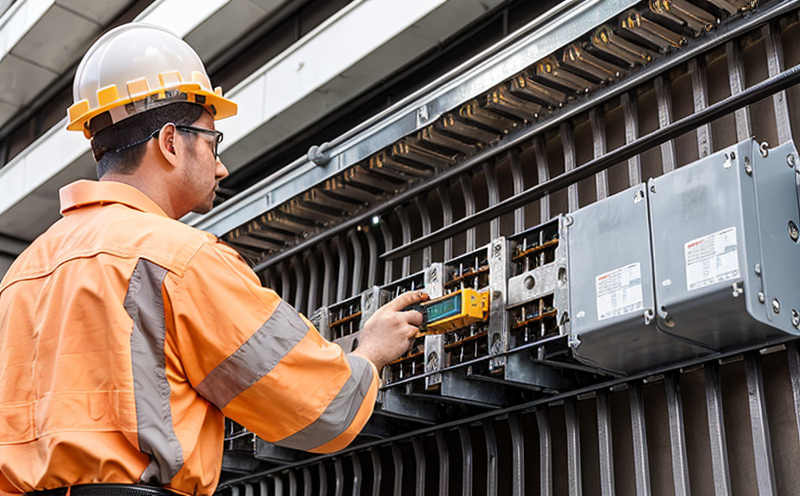Busbar system inspection
The inspection of busbar systems is a critical aspect within the broader scope of electrical and electronic systems. Busbars, which are conductive structures that carry large currents from generators to transformers or switchgear in power distribution networks, must be meticulously inspected to ensure they meet all necessary standards for safe and efficient operation.
Our team specializes in providing comprehensive busbar system inspections tailored to the specific needs of our clients within various sectors including renewable energy, industrial manufacturing, and critical infrastructure. We employ state-of-the-art inspection techniques that go beyond visual assessments, utilizing advanced instruments such as ultrasonic testing (UT), thermography, and infrared cameras.
One of the primary reasons for regular inspections is to detect potential issues early before they escalate into major problems. This proactive approach helps in maintaining optimal performance levels and extending the lifespan of busbar systems. Additionally, it ensures compliance with relevant international standards such as ISO 15746-2:2013 and IEC 60850.
During an inspection, we first conduct a thorough visual examination to identify any visible signs of damage or wear. Following this initial step, non-destructive testing methods are employed to assess the integrity of the busbar materials. These tests help in identifying internal defects that might not be apparent through simple observations alone.
The quality and reliability of busbars directly impact the overall efficiency of electrical systems. By performing regular inspections, we can prevent costly downtime and ensure continuous power supply for our clients' operations. It is essential to note that improper installation or poor maintenance practices could lead to dangerous situations, including fires and other hazards associated with faulty electrical connections.
In summary, a robust busbar system inspection program not only enhances safety but also promotes operational efficiency by minimizing disruptions caused by unexpected failures. Our expertise lies in delivering reliable assessments based on current best practices and recognized international standards.
Applied Standards
| Standard | Description |
|---|---|
| ISO 15746-2:2013 | This standard provides guidelines for the inspection of copper and aluminum busbars used in power distribution systems. |
| IEC 60850 | A set of recommendations concerning communication networks and systems for power utility automation. |
| NAS 419 | An aerospace standard covering the qualification testing of materials, parts, assemblies, and services intended for use in spacecraft and related programs. |
| ASTM G65-20 | American Society for Testing Materials standard defining procedures for measurement of surface resistance to moisture penetration by means of a salt spray test. |
The application of these standards ensures that our inspections are conducted in accordance with industry best practices, thereby providing accurate and reliable results. Compliance with such internationally recognized norms adds credibility to the findings and recommendations made during each inspection process.
Customer Impact and Satisfaction
The importance of busbar system inspections cannot be overstated in today's highly regulated environment. For our customers, especially those operating within critical infrastructure like power plants or data centers, uninterrupted service is paramount. Our rigorous inspection processes ensure that any potential risks are identified early on, allowing for timely corrective actions to be taken.
By partnering with us, your organization can expect not only peace of mind regarding the safety and reliability of its busbar systems but also enhanced operational efficiency. Reduced maintenance costs due to preventive measures implemented through our inspections contribute significantly towards long-term savings. Moreover, compliance with applicable regulations helps avoid costly penalties associated with non-conformance.
Our dedicated team strives to exceed expectations by offering personalized service packages designed specifically for your unique requirements. Whether you need routine checks or one-time assessments, we have the expertise and resources necessary to meet all your needs effectively.
Use Cases and Application Examples
In renewable energy facilities, busbars play a crucial role in transferring electrical power from solar panels or wind turbines to transformers. Regular inspections are vital here because even minor issues can disrupt the entire system's functionality. An example would be detecting loose connections caused by environmental factors like temperature fluctuations or mechanical stress.
For industrial manufacturing plants, robust busbar systems support heavy machinery operations requiring significant electrical power input. Here, an inspection might focus on checking for signs of overheating around joints where high current flows pass through. Such examinations help maintain optimal working conditions and prevent unexpected shutdowns during peak production periods.
In critical infrastructure such as hospitals or data centers, uninterrupted power supply is non-negotiable. Busbars connecting various essential systems must be subjected to stringent inspection protocols periodically. This ensures that even in adverse situations like natural disasters or equipment malfunctions, vital services continue without interruption.





